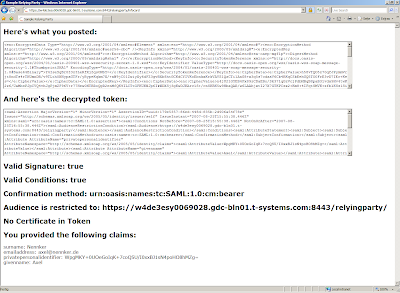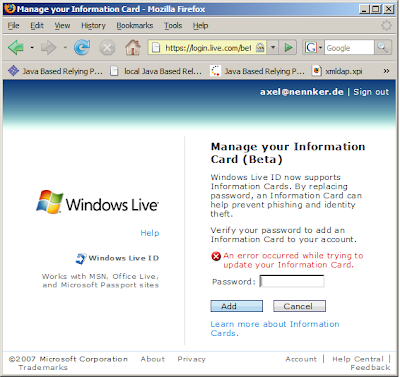The xmldap relyingparty (svn version 339 or newer) now displays the subject's confirmationmethod:
urn:oasis:names:tc:SAML:1.0:cm:bearer or urn:oasis:names:tc:SAML:1.0:cm:holder-of-key
and the audience restriction.
...
<saml:Conditions
NotBefore="2007-08-21T07:18:50.605Z"
NotOnOrAfter="2007-08-21T08:18:50.605Z">
<saml:AudienceRestrictionCondition>
<saml:Audience>
https://w4de3esy0069028.gdc-bln01.t-systems.com:8443/relyingparty/
</saml:Audience>
</saml:AudienceRestrictionCondition>
</saml:Conditions>
<saml:AttributeStatement>
<saml:Subject>
<saml:SubjectConfirmation>
<saml:ConfirmationMethod>
urn:oasis:names:tc:SAML:1.0:cm:bearer
</saml:ConfirmationMethod>
</saml:SubjectConfirmation>
</saml:Subject>
...
Here are two screenshots of the relying party:
First the assertion generated by the Firefox id selector:

Second the assertion generated by Windows CardSpace:

The scrupulous reader of this blog will notice that this Firefox id selector generated a bearer token, while I claimed here, that it generates holder-of-key tokens. I am still investigating why the Microsoft Demosite FriendsWithCards does not accept my tokens :-| It still says that the signature is wrong... That's why I want the token to be as similar to the CardSpace one as possible.
Anyways, with the help of Microsoft we will find the reason for this. Thanks to Marc, Mike and Kim.
Back to the topic of this post: It is good that the xmldap relyingparty now shows the audience restriction.






